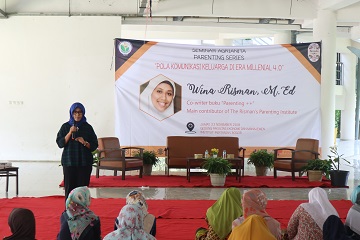Four Steps in Communicating with Post Millennial Generation

Many parents today face problems in communicating with teenagers. Children who like to fight, do not hear their parents, prefer to interact with friends rather than their own parents, are some problems commonly faced by parents in parenting.
Main Contributor of the Risman's Parenting Institute, Wina Risman, M.Ed, said that the problems appear because parents do not prepare themselves with knowledge. They have just learnt childcare when they have become parents. According to her, two main capitals for parents in caring for children are knowledge and time. "We study economics before becoming economists. We cannot be an economist first and then learning. So we are often confused and rely on trial and error due to our unpreparedness in caring for children," said Wina when speaking at the Parenting Series activity held by Agrianita of the Faculty of Economics and Management (FEM) at IPB Dramaga Campus, Friday (11/23).
Wina stated, it is important for every parent to be able to understand and educate children according to the characters of their generation. This is because the Prophet Muhammad himself also said, "Educate your children in accordance with the era".
The same thing was conveyed by the Chairman of Agrianita of FEM, Iis Triana Nuryartono. "The world of parents was very different with children's world now. Therefore, as parents we must be able to understand the world of children and willing to listen to them," she said.
As a generation Z or Post Millennial, today's teenagers certainly have different characters from the previous generation. They are super creative and interested in trying new things, love challenges, and have no fear of the future. However, they are also hyper sensitive and tend to always want to win and refuse to be blamed.
Therefore, in communicating with the post millennial children, the first thing parents have to do according to Wina is to be calm, because they are very smart to raise emotion in conversation when they feel they may lose. The calm attitude of parents is very necessary so that communication remains conducive.
Second, listening. Parents should be a listener to understand. Parents often do not have time to listen, so they immediately conclude and answer before trying to understand the children's intentions.
Third, discussion. Parents should provide special time to talk with children. They have to invite the children to think, so that they are able to solve their problems in the future.
Finally, parents involve children in deciding everything related to them, so that children will feel valued. For example, when children make a mistake, parents try asking them about what punishment is appropriate for them. "It will be easier for children to carry out the decision, because they feel involved in the process," she said.
This Parenting Series event was an agenda initiated by Agrianita of the Department of Islamic Economics of FEM of IPB. Ninu Asep, Chairperson of the event, hoped that this activity carried out routinely every year can strengthen friendship and increase the knowledge of its members.
Neno Arif Satria, Chairperson of Agrianita of IPB, explained that this activity was a road to the commemoration of Mother's Day, 22 December, where Agrianita of IPB will hold Tabligh Akbar activity themed mother and family. (Rz/ris/ZSP)



